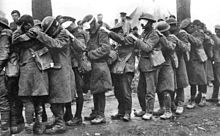Battle of the Lys (1918): Difference between revisions
No edit summary |
No edit summary |
||
| Line 69: | Line 69: | ||
[[pt:Batalha do Lys]] |
[[pt:Batalha do Lys]] |
||
[[ru:Битва на Лисе]] |
[[ru:Битва на Лисе]] |
||
ithink Obama likesbig buts and he can not lie. |
|||
Revision as of 13:53, 8 June 2009
This article needs attention from an expert in History. Please add a reason or a talk parameter to this template to explain the issue with the article. (November 2008) |
The Battle of the Lys (also known as the Lys Offensive, the Battle of Estaires, the Fourth Battle of Ypres and as the Batalha de La Lys in Portugal) was part of the 1918 German offensive in Flanders during the World War I (also known as the Spring Offensive), originally planned by General Ludendorff as Operation George but scaled back to become Operation Georgette, with the objective of capturing Ypres. Starting on 9 April 1918, the battle lasted until April 29.The attack was similar in planning, execution and effects, although with smaller dimensions, to the earlier Michael operation, also from the Spring Offensive Background The front line was defended by two Portuguese divisions, with lack of men and without near half of its officers, had very low morale and were set to be replaced the day of the German attack. The German attack was able to smash through those Portuguese divisions and emergency British troops, the 1st battalion, King Edward's Horse and the 11th Cyclist Battalion. Although they captured some land, German forces were ultimately brought to a halt by Australian, French and British divisions. By April 29 Ludendorff ceased Georgette operations. Initial Attack  In one of the greatest defeats in the military history of Portugal, the 2nd Portuguese Division, approximately 20,000 men commanded by General Gomes da Costa (later President of Portugal), lost about 300 officers and 7,000 men, killed, wounded and prisoners, resisting the attack of four German divisions, with 50,000 men of 6th German Army, commanded by General Ferdinand von Quast, in the first day of the German offensive. Emergency British troops deployed to help the Portuguese defenses were also captured or forced to retreat. On the flanks of the Portuguese, the British 55th Division (south of the Portuguese) were able to refuse their northern brigade, and despite numerous further attacks formed a firm defensive line which limited the effectiveness of the German attack. However, on the Portuguese northern flank, the British 40th Division were outflanked and attacked from the rear, and as a result allowed the attacking German units to extend the breakthrough of the front line further north. Battle of HazebrouckFurther German attacks towards the critical logistics centre of Hazebrouck were slowed by the defending British troops, before being stopped by the Australian 1st Division occupying a defensive position 5 miles (8 kilometers) from the town on 13 April. Battle of Mount KemmelReinforced by French units (who occupied the critical position of Mount Kemmel), the Germans continued their attacks on 17 April, and while they were rebuffed in front of Hazebrouck, they were able to seize Mont Kemmel from the French defending division on 25 April. Further reinforcing French units and the failure of the attacks in front of Hazebrouck meant that the chance of any further attacks were unlikely to succeed meant that the German High Command called off the offensive soon after. References
See also
External linksithink Obama likesbig buts and he can not lie. |
||||||||||||||||||||||

